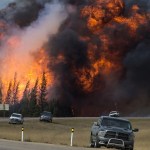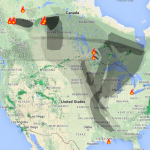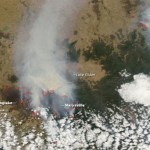wildfire
Four weeks after a wildfire began in the Canadian province of Alberta, thousands of structures in Fort McMurray have been destroyed, over 100,000 people have been evacuated, and 2200 square miles have gone up in smoke. The fire has also shut down commercial extraction of tar sands, a source of fossil fuel and the reason for Fort McMurray's prosperity. Greg Laden points out the perverse cause and effect of it all: tar sands contribute to global warming, global warming contributes to weather variation and drought, drought makes regions extra-vulnerable to wildfire, and wildfire shuts down tar…
The Climate Change Connection
It is hard to understand the connection between climate change and wild fire. This is in part because it is hard to understand the factors that determine the frequency and extent of wild fires to begin with, and partly because of the messiness of the conversation about climate change and fire. I'm going to try to make this simple, I don't expect to succeed, but maybe we can achieve a somewhat improved understanding.
Fires have to start, then they burn for a while, then they stop.
Most wild fires are probably started by humans. This does not mean that human…
A memorial service honoring the 19 firefighters killed in the Yarnell Hill, AZ wildfire will be held today at Tim's Toyota Center in Prescott Valley, AZ. Forty eight hours earlier, an honor guard escorted 19 hearses carrying members of the 20-person Granite Mountain Hotshots on a 125-mile route from Phoenix to Prescott. This string of somber ceremonies started Monday, July 1 when a crew of 12 firefighters were permitted on the mountain to remove the firefighters' bodies.
In "It's something you never want to see again," The (Arizona) Republic's Kristina Goetz describes a…
I recently wrote about the tragic bushfires in Australia and how it seems to me that it is reasonable to ask if this would have happened without anthropogenic climate changes.
Real Climate has the details on this in their latest post: Bushfires and extreme heat in south-east Australia.
The post is by David Karoly, Professor of Meteorology at the University of Melbourne in Australia. He identifies four factors in the fire's ferocity - maximum temperatures, relative humidity, wind speeds and the ongoing drought - and discusses the possible role of climate change in each of them. For three of…
"Have you been following what's happening in Australia?"
That was the question I asked my morning class, even though it has nothing to do with the topic of the day's session. I was very pleased to see most of the heads nod and the hands raise in answer to my question. My students knew that the Australian state of Victoria is being devastated by wildfires that have killed at least 181 people and untold numbers of livestock. The fires have turned to ruins whole towns, with people trapped and unable to flee in time. It's awful to contemplate, but there is strong reason to suspect that at least…


